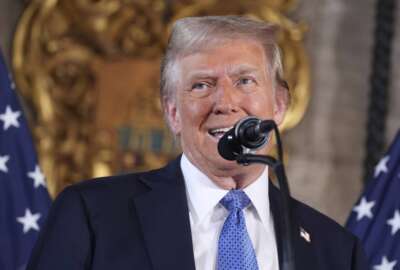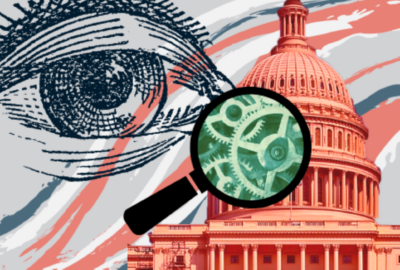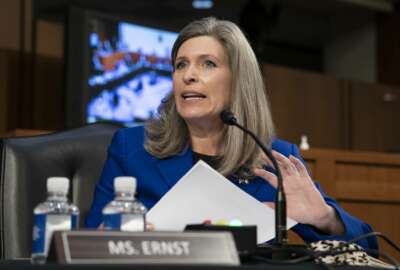Trump sets ultimatum for USPS to raise prices before approving $10B emergency loan
President Donald Trump said his administration won’t approve a $10 billion loan to USPS guaranteed under the CARES Act unless the agency first agrees to take his...
The Postal Service warns it will run out of cash by the end of the fiscal year, but President Donald Trump on Friday said the agency should raise its package and shipping rates by “approximately four times” before seeking more aid from Congress.
While the president has made this recommendation several times, this most recent instance came with an added wrinkle: Trump said his administration won’t approve a $10 billion loan to USPS guaranteed under the $2 trillion Coronavirus Aid, Relief, and Economic Security (CARES) Act unless the agency first agrees to take his advice.
“If they don’t raise the price, I’m not signing anything, so they’ll raise the price so that they become maybe even profitable, but so they lose much less money. And if they don’t do it, I’m not signing anything and I’m not authorizing you to do anything,” Trump said in a White House press conference alongside Treasury Secretary Steven Mnuchin.
Mnuchin said his team at Treasury is “actively working” with USPS officials in providing the $10 billion loan, but acknowledged some caveats.
“We are going to put certain criteria for a postal reform program as part of the loan, and the board is recruiting a new postmaster general and doing postal reform,” he said.
USPS spokesman Dave Partenheimer told Federal News Network that the agency didn’t have additional updates on the agency’s progress with securing the $10 billion loan from Treasury.
However, he said that with a force of more than 630,000 employees, at least 1,424 have tested positive for the coronavirus, with some deaths.
In a virtual town hall on Tuesday with Sen. Bernie Sanders (D-Vt.), National Postal Mail Handlers Union President Paul Hogrogian said at least 1,800 postal workers have tested positive for coronavirus or are presumed positive.
At least 30 postal workers, Hogrogian said, have died as a result of the coronavirus.
The Trump administration’s conditions come weeks after postal unions and members of the House Oversight and Reform Committee raised concerns about the terms and rollout of the emergency loan.
In an April 2 interview, House Oversight and Reform Committee government operations subcommittee chairman Gerry Connolly (D-Va.) said USPS and Treasury had negotiated lifting the Postal Service’s borrowing cap before the pandemic.
But in return, he said Treasury asked for greater oversight of USPS.
“Essentially, the Treasury Department insisted that management responsibilities be transferred from the Postal Service itself, which is a quasi-independent agency, to the Treasury Department. That was an unacceptable condition, and it’s a step we fear toward trying to privatize the Postal Service,” Connolly told Federal News Network.
A few days after that interview, Connolly joined committee chairwoman Carolyn Maloney (D-N.Y.), as well Sens. Tom Carper (D-Del.) and Gary Peters (D-Mich.) in a letter to Mnuchin stating that the USPS Board of Governors has the exclusive authority to appoint or remove the postmaster general or “direct and control the expenditures and review the practices and policies of the Postal Service.”
Lawmakers also asked Treasury for the terms and conditions of the $10 billion loan “including information about any postal policy and/or operational provisions Treasury intends to improperly include as a condition of borrowing.”
The White House announcement also comes after the Washington Post reported Thursday that Treasury officials were looking at using the funding as leverage to have more say over the Postal Service’s business operations.
While the White House doesn’t have direct say over the business operations of the Postal Service, its Board of Governors, which is in the process of naming a new postmaster general, consists entirely of Trump appointees.
Postmaster General Megan Brennan expected to step down from her position by the end of January, but postponed her retirement indefinitely while the board searched for her successor.
While the Postal Service has been in dire financial straits for years, Brennan told House members earlier this month that the agency would run out of cash by the end of this fiscal year without assistance from Congress.
Citing a steep decline in mail volume during the pandemic, USPS has asked Congress for $75 billion in emergency funding — $25 billion in emergency appropriations, another $25 billion for “shovel-ready” projects to modernize the agency’s aging vehicle fleet and facilities and an added $25 billion line of credit from Treasury.
The agency ordinarily is self-funded, and receives no congressional funding.
Throughout the pandemic, Trump has remained adamant that the USPS leadership should look to increasing the agency’s rates before seeking further assistance.
“The Postal Service is a joke because they’re handing out packages for Amazon and other internet companies, and every time they put out a package, they lose money on it,” Trump said. “So Amazon and other internet companies and delivery companies are dropping all of their — not all of them — but a big portion of packages into a Post Office, and the Post Office is supposed to deliver the packages, and they lose a lot of money.”
While the Postal Service has seen steady growth in its package and shipping business in recent years, officials from the National Association of Letter Carriers last year estimated that packages only make up about 30% of the agency’s total revenue.
Package Coalition Chairman John McHugh said the president’s mandate to “arbitrarily” quadruple or quintuple package prices “will only raise prices for consumers, raise prices for small businesses and raise prices for rural communities.”
“Now, when Americans need affordable and reliable package delivery service more than ever, Congress must fight to guarantee emergency relief for the Postal Service and stop this package tax,” McHugh said in a statement.
While the Postal Service operates as a “last-mile” delivery option for its private-sector shipping competitors, the Postal Regulatory Commission reviews the negotiated service agreements between USPS and businesses to ensure that the agency receives a fair rate.
The Postal Service, by law, cannot subsidize private companies.
However, the D.C. District Court of Appeals last called on the PRC to rethink the formula it uses to determine whether the Postal Service’s competitive package business generates enough revenue to justify its costs.
A three-judge panel ruled that the most recent formula the commission used to calculate the “appropriate share” of revenue needed to cover operational costs “fails to articulate a comprehensible standard.”
The president’s ultimatum on postal rates has also renewed concerns from postal unions that the administration would seek to privatize the postal service.
The Office of Management and Budget in June 2018 proposed a path to privatize USPS as part of a larger government reorganization, but ultimately walked that plan back in favor of recommendations from a White House postal task force.
That task force, led by Mnuchin, recommended later that year rolling back the ability of postal unions to collectively bargain over compensation.
“They now see an opportunity to carry out those task force recommendations and using this crisis to do it,” American Postal Workers Union President Mark Dimondstein said Tuesday in the Sanders virtual town hall.
The Postal Service’s financial woes began long before mail declines from the current pandemic. The agency has ended the past 13 years with net financial losses.
A 2006 mandate to pre-fund retiree health benefits for postal retirees accounts for a significant portion of its losses. While the House passed a bill in February that would repeal this pre-funding mandate, the White House postal task force recommended keeping that mandate in place.
The Government Accountability Office estimates USPS has defaulted on more than $48 billion in payments to that fund, which will run out of money by 2030.
However, GAO finds that USPS’ total unfunded liabilities and debt — about $143 billion in 2018 — has grown to double the agency’s annual revenue.
In a tweet following the press conference, Trump added that he “will never let our Post Office fail.”
“It has been mismanaged for years, especially since the advent of the internet and modern-day technology,” he said. The people that work there are great, and we’re going to keep them happy, healthy, and well!”
Copyright © 2024 Federal News Network. All rights reserved. This website is not intended for users located within the European Economic Area.
Jory Heckman is a reporter at Federal News Network covering U.S. Postal Service, IRS, big data and technology issues.
Follow @jheckmanWFED






